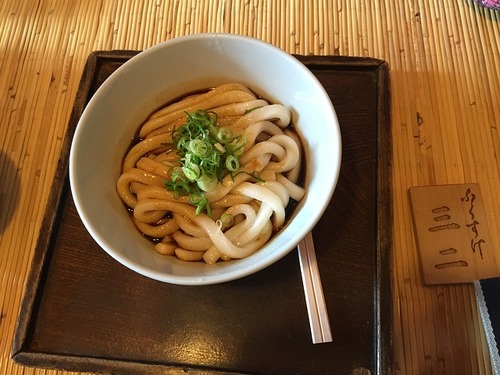Are Udon Noodles Bad For You?
Short answer
Other than being fairly high in sodium, udon noodles aren't terrible for you.
Recommended Alternative
A fairly even ratio of beneficial and harmful qualities. Moderation is important. Very general topics that can lean towards both sides of the spectrum will be placed here as well. Rice, for example, can be good or bad depending on the type.
View Full Grading System
Category 'A'
Very healthy and numerous health benefits. Side effects are rare. Things rated an 'A+' are typically necessary for survival (for example, water).
Very healthy and numerous health benefits. A few harmful qualities may be associated, but only under certain circumstances such as an allergic reaction.
Very healthy and numerous health benefits. Harmful qualities may be associated, but aren't usually serious.
It is important to note that even the best things in life can become bad in immoderate amounts. So, although something may be rated an 'A+', overconsumption/overdoing can bring unwanted effects.
Category 'B'
Very beneficial to your health. Things rated a 'B+' may have a few harmful qualities to pay attention to.
Overall beneficial to your health. Things rated a 'B' may have some harmful qualities to pay attention to.
More beneficial to your health than not. However, harmful qualities are most likely associated and shouldn't be overlooked.
The main difference between category 'A' and category 'B' is the harmful qualities typically present in 'B' items. Serious side effects are usually uncommon, but are still possible and should be taken note of.
Category 'C'
Both beneficial and harmful qualities associated. Things rated a 'C+' are typically a bit more on the beneficial side. Still, moderation is important.
A fairly even ratio of beneficial and harmful qualities. Moderation is important. Very general topics that can lean towards both sides of the spectrum will be placed here as well. Rice, for example, can be good or bad depending on the type.
More harmful than beneficial. Side effects are common, especially when consumed/done excessively. Moderation is very important.
Category 'C' usually denotes to both good and bad qualities. When it comes to this category, it is important to keep this word in mind: moderation.
Category 'D'
Harmful to your health. Although benefits may be associated, the bad most likely outweighs the good. Moderation is very important.
Harmful to your health. A few benefits may be associated, but the bad outweighs the good. Moderation is extremely important.
Harmful to your health. Very few, if any, benefits are present. Things in this category should be avoided as much as possible.
Category 'D' is typically for things that are more harmful than beneficial. While consuming/doing something unhealthy once in a blue moon shouldn't hurt, we definitely recommend eliminating 'D' items as a regular part of your routine/diet.
Category 'F'
Category 'F' is for things that fail to bring anything beneficial to the table, and are very harmful to your health. We recommend completely avoiding anything in this category. Long-term side effects of 'F' items are usually very serious.
Category 'N'
'N' stands for neutral. Things placed into this category are generally (a) neither good nor bad for you, or (b) lack the necessary evidence to reach any conclusions.
Long answer
Udon noodles, a form of noodle common in Japanese cuisine that was introduced to Japan in the 9th century CE by Buddhist priest Kakai, is made primarily from wheat flour, water, and salt. The health benefits will vary depending on whether or not you get your udon noodles pre-made or if they are homemade. Typically, homemade udon noodles will be more beneficial as you can determine what goes in them.
Refined udon noodles will often not contain much in the way of nutrients, and fiber is low with only 4% of the daily recommended value. Whole-wheat udon noodles, on the other hand, contain a variety of nutrients with some versions containing up to 20% of the daily recommended value for fiber.
While the amount of calories in udon noodles are less than that in, say, spaghetti - there still is a significant amount, with nearly 200 calories being present in a 2 oz serving. Excess calories can lead to weight gain and subsequently an increased risk of diabetes and heart disease. Another concern regarding udon noodles is the sodium content, with one cup providing over a quarter of the daily recommended limit. The effects of excess sodium are well documented and include headaches (short-term) as well as kidney and liver damage (long-term).
Udon noodles will also be a concern for people trying to avoid gluten or who have Celiac's disease, due to the wheat content. Overall, whole-wheat udon noodles can provide a decent amount of nutrients (particularly fiber, which aids in LDL reduction and thus reduces the risk of cardiovascular disease). However, for people who cannot eat wheat, udon noodles may be, at best, thought of as a lower-calorie alternative to other types of pasta.
Possible short-term side effects
- headache
-
dehydration
-
water retention
Possible long-term side effects
- obesity
-
heart disease
-
liver and kidney damage
Ingredients to be aware of
Benefits
- whole wheat versions provide several important nutrients
Our Wellness Pick
(what is this?)
Buckwheat Sweet Potato Pasta
- Organic ingredients
- Gluten-free
- Rich in fiber
- Convenient 3-pack
- Three servings per package
Learn More!
Please turn your Ad Blocker off to see this content. Thank you!
Thank you for your feedback!
Written by Jeff Volling
Published on: 02-17-2016
Last updated: 12-01-2023
Thank you for your feedback!
Written by Jeff Volling
Published on: 02-17-2016
Last updated: 12-01-2023

 Approved by
Approved by 















